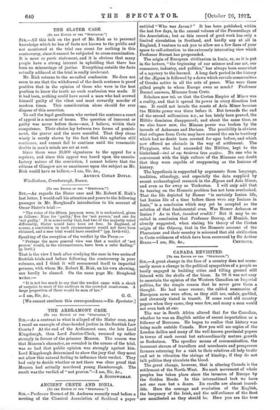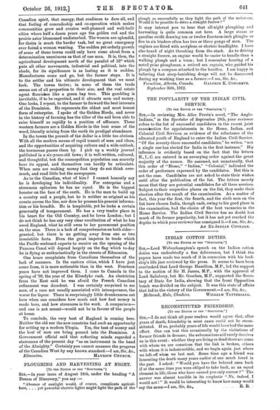CANADA REVISITED.
[To TRY EDITOR OP TEE ••srscrAios.":1 Sin,—A great change in the face of a country does not neces- sarily mean a change in the political sympathies of a people so busily engaged in building cities and tilling ground still littered with the skulls of the bison. In '98 it was not easy to ascertain the opinion of the Western Canadian on Imperial politics, for the simple reason that he never gave them a thought. He had some excuse; the cabled summaries of European news were often, as they still are, unfair, garbled, and obviously tinted in transit. If some read old country papers when they came, they were few, and many a man would not even look at one.
The war in South Africa altered that for the Canadian, whether he was an English settler of recent importation or a follower of Bourassa. He began to realize that history was being made outside Canada. Now you will see copies of the London dailies and many of the well-known provincial papers in towns of such recent but extraordinarily mature growth as Saskatoon. The speedier means of communication, the incessant stream of travellers and merchants and prosperous farmers returning for a visit to their relatives all help to stir and set in vibration the strings of kinship; if they do not talk politics they circulate the blood.
The great change, however, that is altering Canada is the settlement of the North-West. No such movement of whole peoples has taken place since the invasion of Europe by the Golden Horde. In this international trek we have not one race but a dozen. Its results are almost incred- ible. Here the courage and resolution of the English, the buoyancy of the Irish, and the self-reliance of the Scot are manifested as they should be. Here you see the true
Canadian spirit, that energy, that readiness to dare all, and that feeling of comradeship and co-operation which makes' communities grow and creates well-planned and well-built cities where half a dozen years ago the golden rod and the prairie aster blossomed undisturbed. The women are splendid, for theirs is much the harder task, but no great emergency ever foand a woman wanting. The sudden yet orderly growth of some of these towns could only have come about from a determination unanimous as that of one man. It is, then, the agricultural development north of the parallel of 52° which puts all other movements, industrial and political, into the shade, for its significance is as lasting as it is sudden. Manufactures come and go, but • the farmer stays. It is to the settler and his ultimate development that • we must look. The towns thrive ; in some of them the trade seems out of all proportion to their size, and the real estate agent flourishes like a green_ bay tree. This gambling is inevitable, if to be regretted, and it attracts men and money. One looks, I repeat, to the farmer to forivard the best interests of the Dominion. He represents the oldest and most honest form of enterprise. I spoke of the Golden Horde, and never in the history of farming has the tiller of the soil been able to raise himself so rapidly to a position of affluence. These western farmers are a Golden Horde in the best sense of the word, literally mining from the earth its prodigal abundance.
In the towns the pursuit of the dollar is a little too obvious. With all the modern means of rapid transit of men and ideas, and the opportunities of acquiring culture and a wide outlook, the townsman passes them by. I pick up a weekly journal published in a six-years-old town ; it is well-written, cultured, and thoughtful, but the cosmopolitan population can scarcely hear its appeal, and themselves can hardly be articulate. When men are making money fast they do not think over- much, and read little but the newspapers.
As to the Canadian, what of him P I cannot honestly say he is developing his individuality. For enterprise and a strenuous optimism he has no equal. He is the biggest booster on the face of the earth. He is the man to build up a country and a people, but he is neither so original as his cousin across the line, nor does he possess his general informa- tion or his breadth. He is hospitable, yet he lacks a certain generosity of temperament. He has a very tender place in his heart for the Old Country, and he loves London ; but I do not think he has any very clear recollection of what he has owed England, what he still owes to her paramount position on the seas. There is a lack of comprehension on both sides— granted, but there is no getting away from one or two irresistible facts. Even the great impetus to trade which the Pacific seaboard expects to receive on the opening of the Panama Canal will depend largely on the flag which to-day he is flying so enthusiastically in the streets of Edmonton.
One hears complaints from Canadians themselves of the lack of manners. In the eastern cities, which I have just come from, it is more noticeable than in the west. Fourteen years have not improved them. I came to Canada in the spring of '98, the year of the Klondyke rush. An electrician from the East said be was afraid the French Canadian refinement was decadent. I was certainly surprised to see men, of a race not usually associated with intemperance, the worse for liquor. There is surprisingly little drunkenness out here when one considers how much and how fast money is made here, and how strenuous is the work. A comparison— and one is not meant—would not be in favour of the people at home.
To conclude, the very best of England is coming here. Neither the old nor the new countries had such an opportunity for setting up a modern Utopia. Yes, the best of money and the best of men are being poured into the Dominion. A Government official said that reflecting minds regarded a statesman of the present day "as an instrument in the band of the Almighty." Certainly you cannot measure the progress of the Canadian West by any known standard.—I am, Sir, &c.,



















































 Previous page
Previous page